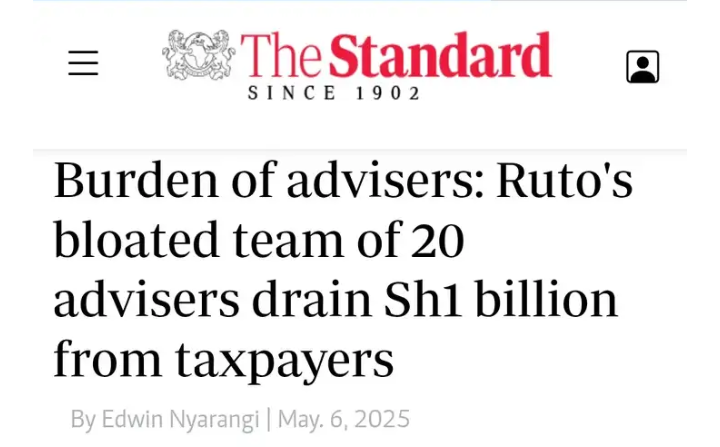President William Ruto’s administration is facing fresh criticism after it was revealed that a large group of presidential advisers is consuming billions of shillings from public funds. This revelation goes against earlier promises made by Ruto that he would run a lean and efficient government.
Documents and sources reviewed by The Standard show that Ruto now has at least 20 senior advisers, many of whom enjoy the same privileges and salaries as Cabinet Secretaries and Principal Secretaries.
These advisers, working in areas such as the economy, politics, climate change, and legal affairs, are reportedly costing the taxpayer over Ksh 1 billion every year. If this continues over a full five-year term, the public will have paid nearly Ksh 20 billion just to maintain this team.
This development has left many Kenyans feeling disappointed, especially considering the President had promised to cut down on unnecessary government spending. Analysts and opposition leaders argue that there is already a full government structure in place, including CSs, PSs, and technocrats, who are capable of advising the President.
They question why additional advisers are needed, especially when the country is struggling financially. The State House budget has also grown during this time, contradicting the President’s earlier stance on austerity.
Sources inside government say that beyond the high salaries, these advisers also get large operational budgets. These include extra allowances, office staff, travel perks, and even luxury cars. Some insiders claim that certain advisers have more power than Cabinet Secretaries, yet there is very little public information about what they have achieved.

This lack of transparency is causing more concern, especially when the country is dealing with tough economic conditions.
Another issue that has been raised is that many of these advisers are actually close political allies of the President. Critics argue that these positions are being used as rewards for loyalty rather than being based on merit or expertise. This practice of political patronage raises serious questions about how public resources are being used.
Civil society groups and financial watchdogs are now asking for a full audit to be done on these advisory roles to determine if they are really necessary and what impact they have had on national leadership. Many Kenyans are already struggling with increased taxes and a growing national debt. The news that billions may be going to fund a bloated team of presidential advisers has added to their frustration.
Pressure is building for Parliament to step in and for oversight bodies like the Public Service Commission and the Salaries and Remuneration Commission to review these appointments. The public is demanding clear answers and more responsible use of their money at a time when the government keeps calling for sacrifices.


